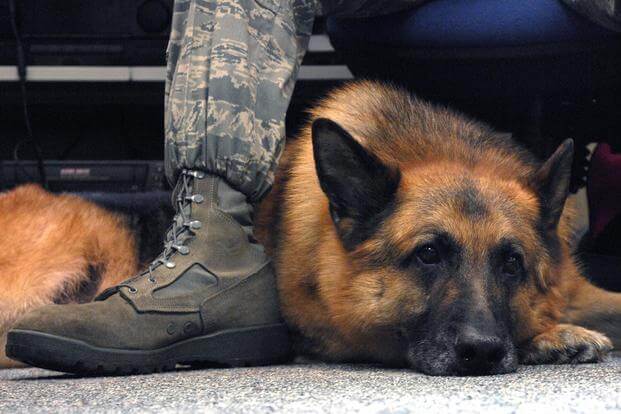I’ve read comments on SpouseBuzz and elsewhere that military families don’t think the base police and housing enforce pet policies pertaining to neglect, lack of veterinarian care, abandonment, deplorable conditions, excessive barking and other forms of cruelty.
In every state, animal cruelty is illegal and a felony in 48 of them. Pet for Patriots lists some signs of animal cruelty and how to report it. It’s a great guide of what to spot, how to document and how to report it. For a more detailed guide, the ASPCA has a comprehensive guide here.
It’s vital to understand the signs of animal cruelty and be prepared to do something about it. And, if the authorities don’t take action, please take these concerns to a higher level. Many bases have Ask the Commander emails, town halls, base newspapers, Facebook Pages and other public forums for our feedback. You must speak up, or it continues and animals pay the ultimate price. Doing nothing is never the answer. Please don’t assume someone else will take care of the problem.
Every family, with or without a pet, should know the housing pet policies and local animal laws. You can find these laws by contacting the shelter contracted to enforce animal law or call the police department. As for the base and/or pet policies, make sure housing gives you a copy when you check in.
In Hawaii, if I don’t think an animal complaint is being followed up on, I email or call the base public affairs office. Get to know your housing officials, game wardens and the military police. Sometimes lines get crossed and complaints may not get resolved, but if that’s the case, we have to take those animal welfare concerns to a higher level.
Sometimes servicemembers don’t have access to pet education, leading to a lack of understanding about what is permitted pertaining to pets. I ask at newcomers, PCS and deployment briefings if they can please provide pet education and resources. I ask housing if they will host pet-friendly events.
These problems won’t end without everyone’s support. If you’ve tried going to one office, try another. Ask other military families for help. Contact your Family Readiness Group. Be prepared to notify a few departments, such as the base veterinarian’s office, public affairs, housing and the military police. If all of them point fingers and tell you it’s someone else’s responsibility to enforce animal law, then please, please write the base commander.
Animals need us to be their voice and save them from needless suffering. Don’t be afraid to speak up or risk retaliation. Many times, you can report without giving your information – some states have criminal tip lines and emails too. Please use them.
Is animal abandonment, cruelty and neglect alarmingly common in your community? If so, does your base or the local police do something about it?
Theresa Donnelly is an active-duty Navy Lieutenant with 16 years of military service, having done 10 years enlisted with multiple overseas deployments. She is the owner of Hawaii Military Pets, an online pet resource for military families living in Hawaii. The blog and Facebook page provide information on moving with pets in the military, boarding information, pet policies in state and federal governments, and overall ways to celebrate the human-animal bond. She routinely partners with local and national animal nonprofits that place special emphasis on military and their companion animals, such as Dogs on Deployment and Pets for Patriots. Follow her on Twitter @tdonnelly76.









